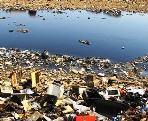The effort is expected to create a LEED-style program for water conservation.
New York-based Riverkeeper filed a petition to force the creation of federal standards for the disposal of cement kiln dust, which can be harmful to water quality.
The plan includes benchmarks to track progress against such priorities as reducing greenhouse gas emissions and protecting America's waters.
North America’s largest lead producer will shut down its Herculaneum lead smelter by Dec. 31, 2013 and provide an initial $8.14 million in financial assurance to guarantee cleanup work.

Under the Resource Conservation and Recovery Act, the law would add a new category of "restricted electronic waste" that cannot be exported from the United States to developing nations, such as Ghana.
The Bureau of Ocean Energy Management, Regulation and Enforcement, formerly MMS, has developed rules for offshore oil and gas operations in federal waters that require operators to develop and follow a 13-point Safety and Environmental Management System.
New disposal regulations may prevent pharmaceuticals from reaching drinking water sources.
The Center for Progressive Reform's new study recommends regulators apply the "precautionary principle" to assess risks and needed safeguards.
The report from U.S. Navy Secretary Ray Mabus says the money will be used for recovery through a coordinated federal, state and local, long-term strategy
Glen Daigger of CH2M Hill will serve as president of IWA for a two-year term.
The U.S. Geological Survey compiled data since the early 1990s to discover that efforts to decrease nutrients in waterbodies have not succeeded.

The Anglo-Dutch company has based its technology on oppositely charged electrodes combined with anionic and cationic selective membranes.

The Securities and Exchange Commission's guidance on disclosing water risks most likely will increase the costs of doing business.
ExxonMobil will provide underwater equipment to the Marine Well Containment Company for use by BP in the Gulf of Mexico.
University of Michigan-led researchers will examine current climate, land use, precipitation and water governance patterns and then combine the data with climate change models to forecast possible effects.
Following the request for information, the San Antonio Water System will release a request for proposals on water supply diversification.
The Outpost Central designed map will allow participants to easily view data; upload photos, qualitative feedback and more.
The group will review and discuss in a public meeting final changes to its report.
The team will establish a Website for watershed managers and planners to analyze river basins, and make more informed decisions.